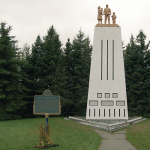Canada’s unions have a long history of standing up for fairness. This includes standing up for the rights of workers in the face of homophobia and discrimination based on their sexual orientation.
In 1991, Delwin Vriend worked in Edmonton as a full-time chemistry laboratory coordinator at The King’s College, a school affiliated with the Christian Reformed Church. Openly gay and equally open about his same-sex relationship, his supervisor ordered him to “quit or be fired” after the college adopted a statement of religious belief that targeted workers like him. Vriend refused and the college fired him.
Wronged, he contacted the Alberta Human Rights Commission to file a discrimination complaint but was refused because sexual orientation was not written into the Alberta Human Rights Code and, therefore, not protected. Denied justice, he sued the provincial government and the Human Rights Commission.
In 1994, an Alberta court ruled in Vriend’s favour. Echoing previous court rulings on the matter, the judge ruled that sexual orientation should be “written in” as a protected class under human rights law. The province’s Conservative government appealed, and in 1996, the Alberta Court of Appeal overruled the decision.
Vriend appealed to the Supreme Court of Canada, joined by the Canadian Labour Congress as one of the intervening parties. He won his case. The Court ruled on Vriend v. Alberta that provincial governments could not exclude protection of individuals from human rights legislation based on sexual orientation. It found no legal basis for drawing a distinction of the Charter of Rights and Freedoms between a positive act and an omission in the law – a controversial ruling because neither Alberta’s Human Rights Code nor the Charter made specific reference to sexual orientation.
With its decision, the Supreme Court read-in sexual orientation as a prohibited ground for discrimination. In response, a few religious groups and Alberta Conservative MLAs called on the governments of Alberta and Canada to invoke the “notwithstanding clause” to overrule the Court’s ruling. But the writing was on the wall and Conservative Premier Ralph Klein declined to take up the cause, even going so far as to suggest that public protests against the ruling were hateful.
The Vriend decision was one of many court challenges that saw interventions from Canada’s unions and the Canadian Labour Congress. Unions had been standing up for the rights of workers in same-sex relationships at the bargaining with employers, before legislative committees, in the courts and on the streets for years. Today, same-sex families and LGBTQ2SI workers can count on greater equality, access to the same pay, benefits and opportunities thanks to the work of unions.


